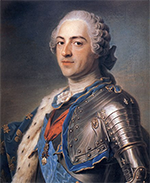The French Revolution
Part 3: Two More Kings
In a mere two decades, French troops were involved with another two wars, one in the New World and the other in Europe. French fortunes took a large turn for the worse as a result of a defeat in the French and Indian War, as Britain claimed all of New France. In the Seven Years War, Britain allied with Prussia against France. As before, these wars cost France a great deal of money, not to mention killing a large number of French soldiers and diverting a large amount of money to the war effort. Unlike the triumphs of Louis XIV, however, the latest two wars, especially, resulted in great losses for France. 
Louis XV died in 1774, and his grandson became King Louis XVI (left). Louis XVI was 19 when he ascended the throne. The pattern had been that the monarch was an absolute one, and the new king endeavored to continue in that capacity. Partly because of his nature and partly because of his teachings, he proved indecisive. He wanted to be seen by his people–all of them, across the economic classes–as a good king, and so he thought that he should take notice of public opinion.

Despite Turgot's opposition, the king firmly approved of aiding the American rebels, not least because their enemy was Great Britain. France sent guns, ammunitions, and supplies–secretly at first. After the American victory at Saratoga in 1777, Louis XVI, thanks in no small part to the intense lobbying of noted American polymath Benjamin Franklin, agreed to the Treaty of Alliance, which brought France into the war on the side of America. Naturally, that escalation of involvement had a cost, in terms of men and matériel required. The royal treasury took yet another hit. The French government also had other anti-British aims. Hoping to regain some of the territories and prestige lost in the Seven Years War, France in the early 1780s formed agreements with anti-British elements in India and Vietnam. Next page > Debts, Reforms, and Political Action > Page 1, 2, 3, 4, 5, 6, 7, 8, 9 |
|
Social Studies for Kids
copyright 2002–2026
David White



 Louis XIV died in 1715, and his great-great-grandson became
Louis XIV died in 1715, and his great-great-grandson became  In 1770, Louis-August, as he was known then, had married
In 1770, Louis-August, as he was known then, had married  Because of his youth and inexperience in such matters, Louis XVI entrusted the running of the country's finances to Anne-Robert-Jacques Turgot (right), who had served under his grandfather, including a long stint as an intendant (tax collector). Turgot took over the post of comptroller general of finance in 1774. He had introduced some reforms under Louis XV and had helped the country weather the famine of 1770–1771. He ruled the finance department with an iron fist and introduced a handful of policies that angered the nobility. He had little support among his fellow ministers for much of his reign. Among other things, he opposed the Crown's support of the rebellious American colonies during the
Because of his youth and inexperience in such matters, Louis XVI entrusted the running of the country's finances to Anne-Robert-Jacques Turgot (right), who had served under his grandfather, including a long stint as an intendant (tax collector). Turgot took over the post of comptroller general of finance in 1774. He had introduced some reforms under Louis XV and had helped the country weather the famine of 1770–1771. He ruled the finance department with an iron fist and introduced a handful of policies that angered the nobility. He had little support among his fellow ministers for much of his reign. Among other things, he opposed the Crown's support of the rebellious American colonies during the 
